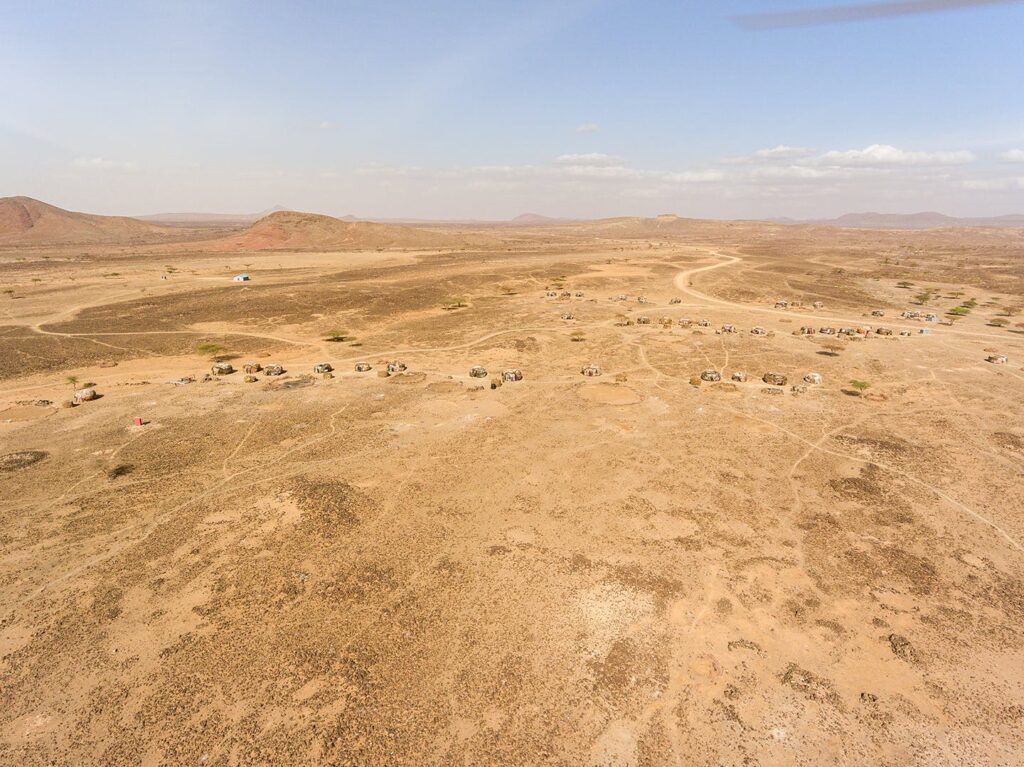Five consecutive failed rainy seasons have led to a historic drought in the Horn of Africa, with 43 million people in need of assistance, 23 million facing acute food insecurity, and more than 7 million children suffering from malnutrition across Ethiopia, Kenya, and Somalia. A changing climate has brought increasingly extreme weather events to the region, including rising temperatures and more frequent and severe droughts. Now spiraling conflict, economic and supply-chain disruptions, and the worst drought in 40 years have combined to create unimaginable hardship and suffering for the region’s most vulnerable.
Years of failed rains have left many families in need of immediate aid. Weak health systems, further strained by the COVID-19 pandemic, are poorly designed to handle the crisis. Even as recent rains have replenished pasture and surface water reservoirs, pastoralist households face a long journey to recovery due to massive loss of livestock, their primary source of livelihoods.
Here in Kenya, where I am privileged to lead the work of Food for the Hungry (FH), I continue to see poor access to water and staggering rates of hunger and malnutrition. And the most vulnerable – infants and young children, pregnant and breastfeeding mothers – are disproportionately impacted. Currently, 4.4 million Kenyans are in need of assistance, with 970,214 children under age five and 142,179 pregnant and breastfeeding women requiring treatment for acute malnutrition. When families struggle to feed themselves, women – even pregnant and breastfeeding women – often eat last and least, leaving them deprived of essential nutrients needed for healthy pregnancies.
The drought has caused unprecedented livestock deaths, reducing milk production and availability and denying many children a primary source of nutrition. As rains have begun to return in recent weeks, some areas of parched earth are unable to absorb large quantities of water, compounding the crisis through flash floods, which are driving more families from their homes. Challenges resulting from contaminated open water sources and widespread lack of water access also contribute to malnutrition and increase the risk of poor sanitation and hygiene. Because infants and young children are at highest risk of death from malnutrition, FH is working to meet urgent humanitarian needs while building resilience among drought-affected communities.

Poor nutrition in the first 1,000 days – the critical period from pregnancy to a child’s second birthday – permanently harms the physical and cognitive development of those who survive. FH is working to prevent and treat malnutrition by providing crucial nutrition, health, and water services in many of Kenya’s arid and semi-arid land (ASAL) counties.
FH is supporting school feeding programs to ensure vulnerable children have access to nutritious food. Because consumption of clean water contributes to good nutrition outcomes, we are also increasing access to clean water and distributing hygiene supplies to promote healthy growth and development and to curb waterborne disease. FH is working with the ministry of health in far-to-reach areas to provide integrated health and nutrition services for vulnerable families through nutrition education and breastfeeding support, as well as malnutrition screenings, treatment, and referrals.
Alongside these life-saving emergency relief efforts, FH is building long-term individual, family, and community resilience. Partnering with those we serve enables us to understand their needs and co-create sustainable solutions. Beyond providing food for schools, we are also working with school agricultural clubs to deepen awareness of agroecological principles and ensure schools have sustainable access to nutritious food even during lean seasons. We continue to collaborate with county governments to support implementation of policies that will ensure long-term access to water. These partnerships enable us to ensure individuals have the agency and resources to feed themselves and their families, and are better positioned to absorb and adapt to future shocks and stresses.
Isaiah 40:31 reminds us that “those who hope in the Lord will renew their strength.” I am honored to walk alongside these brothers and sisters as they work to overcome enormous challenges, and I am humbled by their courage and strength. I am also inspired by the work of my dedicated FH Kenya colleagues and continually encouraged by the transformative impact of our efforts. In the face of enormous challenges, hope remains and our work continues to ensure that every child of God can lead a full, flourishing life.
Photos used in this story curtesy of Paul Wambugu/ERIKS
Alex Mwaura, Food for the Hungry Kenya’s Country Director, has worked in the humanitarian and development sector for over 20 years, 14 of which have been with Food for the Hungry (FH). Alex has a passion for sustainable development and building resilient communities. From an organization development standpoint, Alex is also passionate about building highly functional, God centered, and faith driven teams that design, develop and deliver impactful projects and programs.


